综合英语5高级英语1部分课文翻译
- 格式:doc
- 大小:77.00 KB
- 文档页数:8
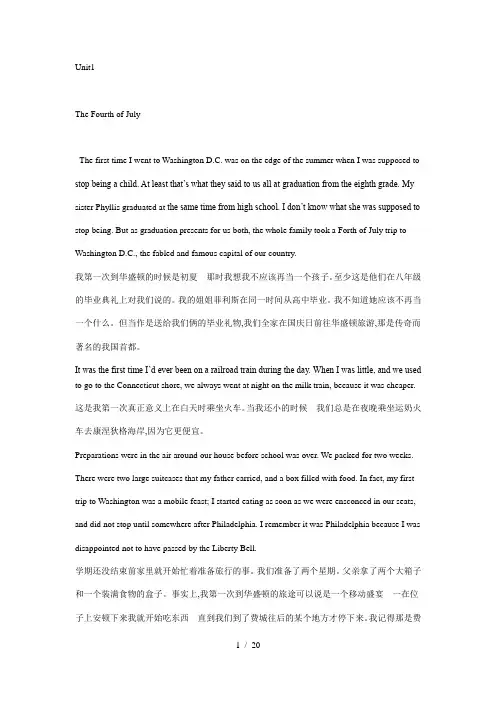

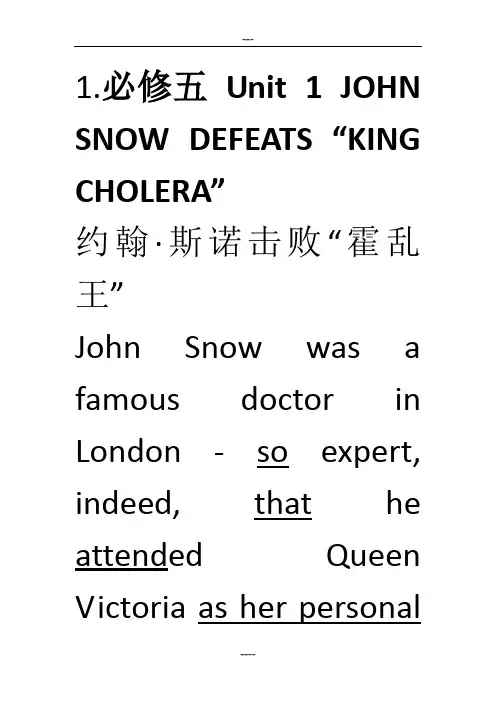
1.必修五Unit 1 JOHN SNOW DEFEATS “KING CHOLERA”约翰·斯诺击败“霍乱王”John Snow was a famous doctor in London - so expert, indeed, that he attended Queen Victoria as her personalphysician.约翰·斯诺是伦敦一位著名的医生——他的确医术精湛,因而成为照料维多利亚女王的私人医生。
But he became inspired when he thought about helping ordinary people exposed to cholera.但他一想到要帮助那些得了霍乱的普通百姓时,他就感到很振奋。
This was the deadly disease of its day.霍乱在当时是最致命的疾病,Neither its cause nor its cure was understood.人们既不知道它的病源,也不了解它的治疗方法。
So many thousands of terrified people diedevery time there was an outbreak.每次霍乱暴发时,就有大批惊恐的老百姓死去。
John Snow wanted to face the challenge and solve this problem.约翰·斯诺想面对这个挑战,解决这个问题。
He knew that cholera would never be controlled until itscause was found.他知道,在找到病源之前,霍乱疫情是无法控制的。
He became interested in two theories that possibly explained how cholera killed people.斯诺对霍乱致人死地的两种推测都很感兴趣。
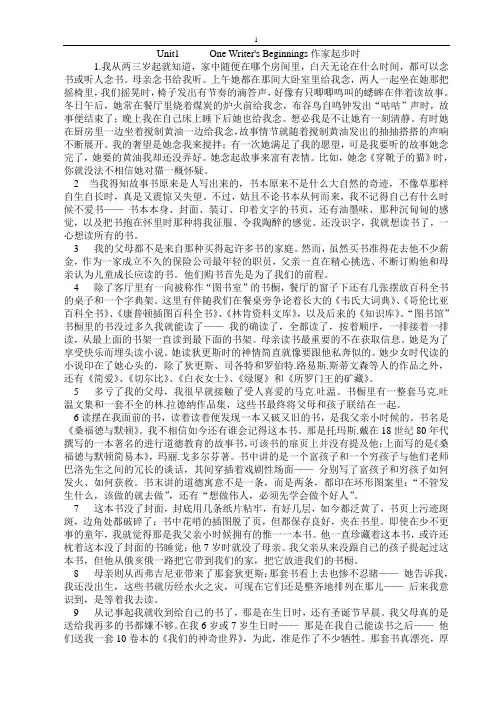
Unit1 One Writer's Beginnings作家起步时1.我从两三岁起就知道,家中随便在哪个房间里,白天无论在什么时间,都可以念书或听人念书。
母亲念书给我听。
上午她都在那间大卧室里给我念,两人一起坐在她那把摇椅里,我们摇晃时,椅子发出有节奏的滴答声,好像有只唧唧鸣叫的蟋蟀在伴着读故事。
冬日午后,她常在餐厅里烧着煤炭的炉火前给我念,布谷鸟自鸣钟发出“咕咕”声时,故事便结束了;晚上我在自己床上睡下后她也给我念。
想必我是不让她有一刻清静。
有时她在厨房里一边坐着搅制黄油一边给我念,故事情节就随着搅制黄油发出的抽抽搭搭的声响不断展开。
我的奢望是她念我来搅拌;有一次她满足了我的愿望,可是我要听的故事她念完了,她要的黄油我却还没弄好。
她念起故事来富有表情。
比如,她念《穿靴子的猫》时,你就没法不相信她对猫一概怀疑。
2 当我得知故事书原来是人写出来的,书本原来不是什么大自然的奇迹,不像草那样自生自长时,真是又震惊又失望。
不过,姑且不论书本从何而来,我不记得自己有什么时候不爱书——书本本身、封面、装订、印着文字的书页,还有油墨味、那种沉甸甸的感觉,以及把书抱在怀里时那种将我征服、令我陶醉的感觉。
还没识字,我就想读书了,一心想读所有的书。
3 我的父母都不是来自那种买得起许多书的家庭。
然而,虽然买书准得花去他不少薪金,作为一家成立不久的保险公司最年轻的职员,父亲一直在精心挑选、不断订购他和母亲认为儿童成长应读的书。
他们购书首先是为了我们的前程。
4 除了客厅里有一向被称作“图书室”的书橱,餐厅的窗子下还有几张摆放百科全书的桌子和一个字典架。
这里有伴随我们在餐桌旁争论着长大的《韦氏大词典》、《哥伦比亚百科全书》、《康普顿插图百科全书》、《林肯资料文库》,以及后来的《知识库》。
“图书馆”书橱里的书没过多久我就能读了——我的确读了,全都读了,按着顺序,一排接着一排读,从最上面的书架一直读到最下面的书架。
母亲读书最重要的不在获取信息。
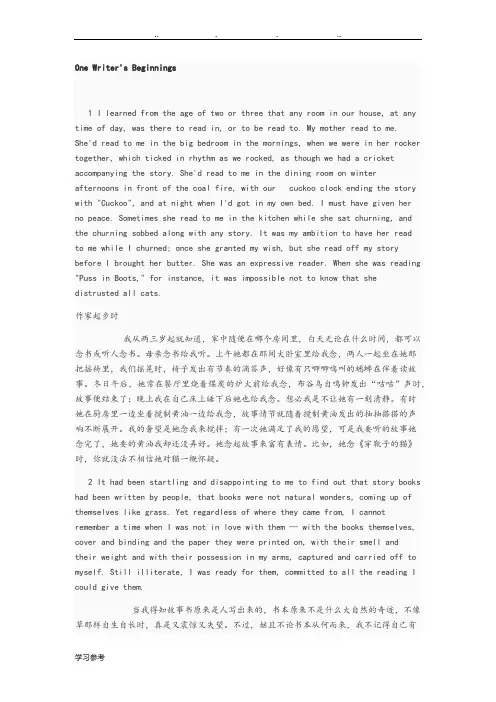
One Writer's Beginnings1 I learned from the age of two or three that any room in our house, at any time of day, was there to read in, or to be read to. My mother read to me.She'd read to me in the big bedroom in the mornings, when we were in her rocker together, which ticked in rhythm as we rocked, as though we had a cricket accompanying the story. She'd read to me in the dining room on winterafternoons in front of the coal fire, with our cuckoo clock ending the story with "Cuckoo", and at night when I'd got in my own bed. I must have given herno peace. Sometimes she read to me in the kitchen while she sat churning, and the churning sobbed along with any story. It was my ambition to have her readto me while I churned; once she granted my wish, but she read off my story before I brought her butter. She was an expressive reader. When she was reading "Puss in Boots," for instance, it was impossible not to know that shedistrusted all cats.作家起步时我从两三岁起就知道,家中随便在哪个房间里,白天无论在什么时间,都可以念书或听人念书。
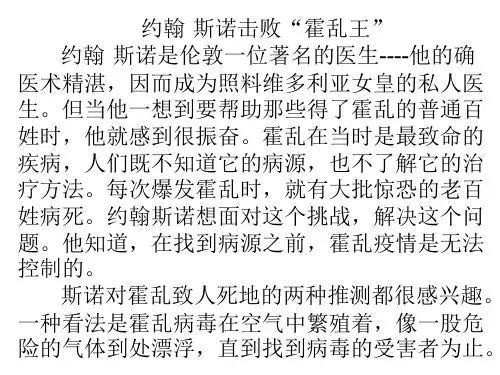
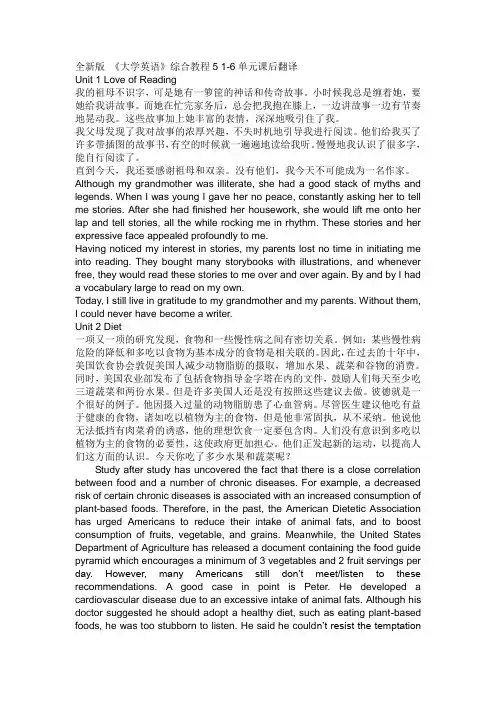
全新版《大学英语》综合教程5 1-6单元课后翻译Unit 1 Love of Reading我的祖母不识字,可是她有一箩筐的神话和传奇故事。
小时候我总是缠着她,要她给我讲故事。
而她在忙完家务后,总会把我抱在膝上,一边讲故事一边有节奏地晃动我。
这些故事加上她丰富的表情,深深地吸引住了我。
我父母发现了我对故事的浓厚兴趣,不失时机地引导我进行阅读。
他们给我买了许多带插图的故事书,有空的时候就一遍遍地读给我听。
慢慢地我认识了很多字,能自行阅读了。
直到今天,我还要感谢祖母和双亲。
没有他们,我今天不可能成为一名作家。
Although my grandmother was illiterate, she had a good stack of myths and legends. When I was young I gave her no peace, constantly asking her to tell me stories. After she had finished her housework, she would lift me onto her lap and tell stories, all the while rocking me in rhythm. These stories and her expressive face appealed profoundly to me.Having noticed my interest in stories, my parents lost no time in initiating me into reading. They bought many storybooks with illustrations, and whenever free, they would read these stories to me over and over again. By and by I had a vocabulary large to read on my own.Today, I still live in gratitude to my grandmother and my parents. Without them, I could never have become a writer.Unit 2 Diet一项又一项的研究发现,食物和一些慢性病之间有密切关系。
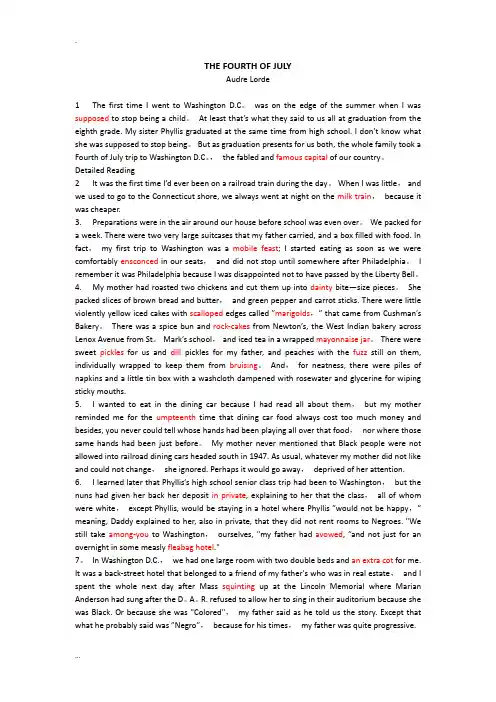
THE FOURTH OF JULYAudre Lorde1 The first time I went to Washington D.C。
was on the edge of the summer when I was supposed to stop being a child。
At least that’s what they said to us all at graduation from the eighth grade. My sister Phyllis graduated at the same time from high school. I don’t know what she was supposed to stop being。
But as graduation presents for us both, the whole family took a Fourth of July trip to Washington D.C。
,the fabled and famous capital of our country。
Detailed Reading2 It was the first time I’d ever been on a railroad train during the day。
When I was little,and we used to go to the Connecticut shore, we always went at night on the milk train,because it was cheaper.3. Preparations were in the air around our house before school was even over。
We packed fora week. There were two very large suitcases that my father carried, and a box filled with food. In fact,my first trip to Washington was a mobile feast; I started eating as soon as we were comfortably ensconced in our seats,and did not stop until somewhere after Philadelphia。
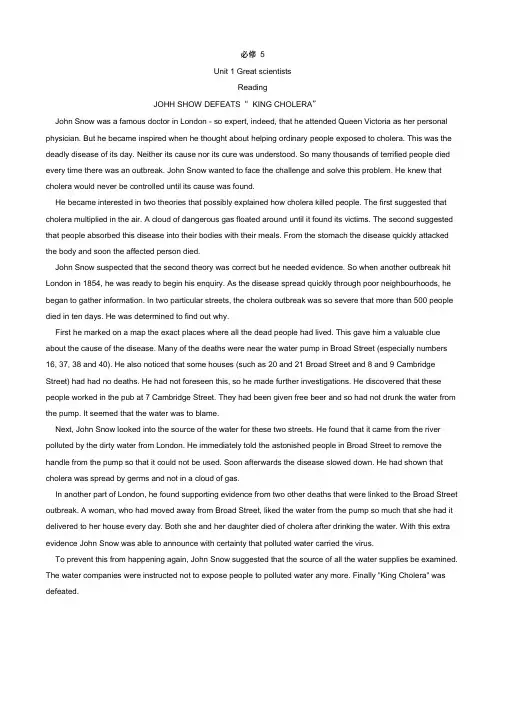
必修5Unit 1 Great scientistsReadingJOHH SHOW DEFEATS“ KING CHOLERA”John Snow was a famous doctor in London - so expert, indeed, that he attended Queen Victoria as her personal physician. But he became inspired when he thought about helping ordinary people exposed to cholera. This was the deadly disease of its day. Neither its cause nor its cure was understood. So many thousands of terrified people died every time there was an outbreak. John Snow wanted to face the challenge and solve this problem. He knew that cholera would never be controlled until its cause was found.He became interested in two theories that possibly explained how cholera killed people. The first suggested that cholera multiplied in the air. A cloud of dangerous gas floated around until it found its victims. The second suggested that people absorbed this disease into their bodies with their meals. From the stomach the disease quickly attacked the body and soon the affected person died.John Snow suspected that the second theory was correct but he needed evidence. So when another outbreak hit London in 1854, he was ready to begin his enquiry. As the disease spread quickly through poor neighbourhoods, he began to gather information. In two particular streets, the cholera outbreak was so severe that more than 500 people died in ten days. He was determined to find out why.First he marked on a map the exact places where all the dead people had lived. This gave him a valuable clue about the cause of the disease. Many of the deaths were near the water pump in Broad Street (especially numbers 16, 37, 38 and 40). He also noticed that some houses (such as 20 and 21 Broad Street and 8 and 9 Cambridge Street) had had no deaths. He had not foreseen this, so he made further investigations. He discovered that these people worked in the pub at 7 Cambridge Street. They had been given free beer and so had not drunk the water from the pump. It seemed that the water was to blame.Next, John Snow looked into the source of the water for these two streets. He found that it came from the river polluted by the dirty water from London. He immediately told the astonished people in Broad Street to remove the handle from the pump so that it could not be used. Soon afterwards the disease slowed down. He had shown that cholera was spread by germs and not in a cloud of gas.In another part of London, he found supporting evidence from two other deaths that were linked to the Broad Street outbreak. A woman, who had moved away from Broad Street, liked the water from the pump so much that she had it delivered to her house every day. Both she and her daughter died of cholera after drinking the water. With this extra evidence John Snow was able to announce with certainty that polluted water carried the virus.To prevent this from happening again, John Snow suggested that the source of all the water supplies be examined. The water companies were instructed not to expose people to polluted water any more. Finally "King Cholera" was defeated.Using LanguageCOPERNICUS' REVOLUTION RRY THEORYNicolaus Copernicus was frightened and his mind was confused. Although he had tried to ignore them, all his mathematical calculations led to the same conclusion: that the earth was not the centre of the solar system. Only if you put the sun there did the movements of the other planets in the sky make sense. Yet he could not tell anyone about his theory as the powerful Christian Church would have punished him for even suggesting such an idea. They believed God had made the world and for that reason the earth was special and must be the centre of the solar system.The problem arose because astronomers had noticed that some planets in the sky seemed to stop, move backward and then go forward in a loop. Others appeared brighter at times and less bright at others. This was very strange if the earth was the centre of the solar system and all planets went round it.Copernicus had thought long and hard about these problems and tried to find an answer. He had collected observations of the stars and used all his mathematical knowledge to explain them. But only his new theory could do that. So between 1510 and 1514 he worked on it, gradually improving his theory until he felt it was complete.In 1514 he showed it privately to his friends. The changes he made to the old theory were revolutionary. He placed a fixed sun at the centre of the solar system with the planets going round it and only the moon still going round the earth. He also suggested that the earth was spinning as it went round the sun and this explained changes in the movement of the planets and in the brightness of the stars. His friends were enthusiastic and encouraged him to publish his ideas, but Copernicus was cautious. He did not want to be attacked by the Christian Church, so he only published it as he lay dying in 1543.Certainly he was right to be careful. The Christian Church rejected his theory, saying it was against God's idea and people who supported it would be attacked. Yet Copernicus' theory is now the basis on which all our ideas of the universe are built. His theory replaced the Christian idea of gravity, which said things fell to earth because God created the earth as the centre of the universe. Copernicus showed this was obviously wrong. Now people can see that there is a direct link between his theory and the work of Isaac Newton, Albert Einstein and Stephen Hawking.Unit 2 The United Kingdom Reading PUZZLES IN GEOGRAPHY People may wonder why different words are used to describe these four countries: England, Wales, Scotland and Northern Ireland. You can clarify this question if you study British history.First there was England. Wales was linked to it in the thirteenth century. Now when people refer to England you find Wales included as well. Next England and Wales were joined to Scotland in the seventeenth century and the name was changed to "Great Britain". Happily this was accomplished without conflict when King James of Scotland became King of England and Wales as well. Finally the English government tried in the early twentieth century to form the United Kingdom by getting Ireland connected in the same peaceful way. However, the southern part of Ireland was unwilling and broke away to form its own government. So only Northern Ireland joined with England, Wales and Scotland to become the United Kingdom and this was shown to the world in a new flag called the Union Jack.To their credit the four countries do work together in some areas (eg, the currency and international relations), but they still have very different institutions. For example, Northern Ireland, England and Scotland have different educational and legal systems as well as different football teams for competitions like the World Cup!England is the largest of the four countries, and for convenience it is divided roughly into three zones. The zone nearest France is called the South of England, the middle zone is called the Midlands and the one nearest to Scotland is known as the North. You find most of the population settled in the south, but most of the industrial cities in the Midlands and the North of England. Although, nationwide, these cities are not as large as those in China, they have world-famous football teams and some of them even have two! It is a pity that the industrial cities built in the nineteenth century do not attract visitors. For historical architecture you have to go to older but smaller towns built by the Romans. There you will find out more about British history and culture.The greatest historical treasure of all is London with its museums, art collections, theatres, parks and buildings. It is the centre of national government and its administration. It has the oldest port built by the Romans in the first century AD, the oldest building begun by the Anglo-Saxons in the 1060s and the oldest castle constructed by later Norman rulers in 1066. There has been four sets of invaders of England. The first invaders, the Romans, left their towns and roads. The second, the Anglo-Saxons, left their language and their government. The third, the Vikings, influenced the vocabulary and place-names of the North of England, and the fourth, the Normans, left castles and introduced new words for food.If you look around the British countryside you will find evidence of all these invaders. You must keep your eyes open if you are going to make your trip to the United Kingdom enjoyable and worthwhile.Using LanguageSIGHTSEEING IN LONDONWorried about the time available, Zhang Pingyu had made a list of the sites she wanted to see in London. Her first delight was going to the Tower. It was built long ago by the Norman invaders of AD 1066. Fancy! This solid stone, square tower had remained standing for one thousand years.Although the buildings had expanded around it, it remained part of a royal palace and prison combined. To her great surprise, Zhang Pingyu found the Queen's jewels guarded by special royal soldiers who, on special occasions, still wore the four-hundred-year-old uniform of the time of Queen Elizabeth I.There followed St Paul's Cathedral built after the terrible fire of London in 1666. It looked splendid when first built! Westminster Abbey, too, was very interesting. It contained statues in memory of dead poets and writers, such as Shakespeare. Then just as she came out of the abbey, Pingyu heard the famous sound of the clock, Big Ben, ringing out the hour. She finished the day by looking at the outside of Buckingham Palace, the Queen's house in London. Oh, she had so much to tell her friends!The second day the girl visited Greenwich and saw its old ships and famous clock that sets the world time. What interested her most was the longitude line. It is an imaginary line dividing the eastern and western halves of the world and is very useful for navigation. It passes through Greenwich, so Pingyu had a photo taken standing on either side of the line.The last day she visited Karl Marx's statue in Highgate Cemetery. It seemed strange that the man who had developed communism should have lived and died in London. Not only that, but he had worked in the famous reading room of the Library of the British Museum. Sadly the library had moved from its original place into another building and the old reading room was gone. But she was thrilled by so many wonderful treasures from different cultures displayed in the museum. When she saw many visitors enjoying looking at the beautiful old Chinese pots and other objects on show, she felt very proud of her country.The next day Pingyu was leaving London for Windsor Castle. "Perhaps I will see the Queen?" she wondered as she fell asleep.Unit 3 Life in the futureReadingFIRST IMPRESSIONSSpacemall: liqiang299A@ 15/11/3008 (Earthtime)Dear Mum and Dad,I still cannot believe that I am taking up this prize that I won last year. I have to remind myself constantly that I am really in AD 3008. Worried about the journey, I was unsettled for the first few days. As a result, I suffered from “ Time lag ” . This is similar to the “ jet lag ” you get from flyieneg,pbguettittinsgeeflamsshyboauckks from your previous time period. So I was very nervous and uncertain at first. However, my friend and guide, Wang Ping, was very understanding and gave me some green tablets which helped a lot. Well-known for their expertise, his parents' company, called "Future Tours", transported me safely into the future in a time capsule.I can still remember the moment when the space stewardess called us all to the capsule and we climbed in through a small opening. The seats were comfortable and after a calming drink, we felt sleepy and closed our eyes. The capsule began swinging gently sideways as we lay relaxed and dreaming. A few minutes later, the journey was completed and we had arrived. I was still on the earth but one thousand years in the future. What would I find?At first my new surroundings were difficult to tolerate. The air seemed thin, as though its combination of gases had little oxygen left. Hit by a lack of fresh air, my head ached. Just as I tried to make the necessary adjustment to this new situation, Wang Ping appeared. "Put on this mask," he advised. "It'll make you feel much better." He handed it to me and immediately hurried me through to a small room nearby for a rest. I felt better in no time. Soon I was back on my feet again and following him to collect a hovering carriage driven by computer. These carriages float above the ground and by bending or pressing down in your seat, you can move swiftly. Wang Ping fastened my safety belt and showed me how to use it. Soon I could fly as fast as him. However, I lost sight of Wang Ping when we reached what looked like a large market because of too many carriages flying by in all directions. He was swept up into the centre of them. Just at that moment I had a "time lag" flashback and saw the area again as it had been in the year AD 2008. I realized that I had been transported into the future of what was still my hometown! Then I caught sight of Wang Ping again and flew after him.Arriving at a strange-looking house, he showed me into a large, bright clean room. It had a green wall, a brown floor and soft lighting. Suddenly the wall moved - it was made of trees! I found later that their leaves provided the room with much-needed oxygen. Then Wang Ping flashed a switch on a computer screen, and a table and some chairs rose from under the floor as if by magic. "Why not sit down and eat a little?" he said. "You may find this difficult as it is your first time travel trip. Just relax, since there is nothing planned on the timetable today. Tomorrow you'll be ready for some visits." Having said this, he spread some food on the table, and produced a bed from the floor. After he left, I had a brief meal and a hot bath. Exhausted, I slid into bed and fell fast asleep.More news later from your loving son,Li QiangUsing LanguageI HA VE SEEN AMAZING THINGSMy first visit was to a space station considered the most modem in space. Described as an enormous round plate, it spins slowly inspace to imitate the pull of the earth's gravity. Inside was an exhibition of the most up-to-date inventions of the 31 st century. A guide (G) showed us around along a moveable path.G: Good morning to all our visitors from 2008. First we're going to examine one of the latest forms of communication among our space citizens. No more typists working on a typewriter or computer! No more postage or postcodes! Messages can now be sent using a "thoughtpad". You place the metal band over your head, clear your mind, press the sending button, think your message and the next instant it's sent. It's stored on the "thoughtpad" of the receiver. It's quick, efficient and environmentally friendly. The only limitation is if the user does not think his or her message clearly, an unclear message may be sent. But we cannot blame the tools for the faults of the user, can we?During the explanation I looked at the pair of small objects called "thoughtpads" on a table. They just looked like metal ribbons. So ordinary but so powerful! While I was observing them, the path moved us on.G: And now ladies and gentlemen, we are in the "environment area". People used to collect waste in dustbins. Then the rubbish was sent to be buried or burned, am I fight? (We nodded.) Well, now there's a system where the waste is disposed of using the principles of ecology. A giant machine, always greedy for more, swallows all the waste available. The rubbish is turned into several grades of useful material, such as "fertilizer" for the fields and "soil" for deserts. Nothing is wasted, andeverything, even plastic bags, is recycled. A great idea, isn't' it?I stared at the moving model of the waste machine, absorbed by its efficiency. But again we moved on.G: Our third stop shows the changes that have happened to work practices. Manufacturing no longer takes place on the earth but on space stations like this one. A group of engineers programme robots to perform tasks in space. The robots produce goods such as drugs, clothes, furniture, hovering carriages, etc. There is no waste, no pollution and no environmentaldamage! However, the companies have to train their representatives to live and work in space settlements. They have to monitor the robots and the production. When the goods are ready they're transported by industrial spaceship back to earth. My mind began to wander. What job would I do? My motivation increased as I thought of the wonderful world of the future.Unit 4 Making the newsReadingMY FIRST WORK ASSIGNMENT"Unforgettable", says new journalistNever will Zhou Yang (ZY) forget his first assignment at the office of a popular English newspaper. His discussion with his new boss, Hu Xin (HX), was to strongly influence his life as a journalist.HX: Welcome. We're delighted you're coming to work with us. Your first job here will be an assistant journalist. Do you have any questions?ZY: Can I go out on a story immediately?HX: (laughing) That' s admirable, but I' m afraid it would be unusual ! Wait till you' re more experienced. First we'll put you as an assistant to an experienced journalist. Later you can cover a story and submit the articleyourself.ZY: Wonderful. What do I need to take with me? I already have a notebook and camera.HX: No need for a camera. You'll have a professional photographer with you to take photographs. You'll find your colleagues very eager to assist you, so you may be able to concentrate on photography later if you' reinterested.ZY: Thank you. Not only am I interested in photography, but I took an amateur course at university to update my skills.HX: Good.ZY: What do I need to remember when I go out to cover a story?HX: You need to be curious. Only if you ask many different questions will you acquire all the information you need to know. We say a good journalist must have a good "nose" for a story. That means you must be able toassess when people are not telling the whole troth and then try to discover it. They must use research toinform themselves of the missing parts of the story.ZY: What should I keep in mind?HX: Here comes my list of dos and don'ts: don't miss your deadline, don't be rode, don't talk too much, but make sure you listen to the interviewee carefully.ZY: Why is listening so important?HX: Well, you have to listen for detailed facts. Meanwhile you have to prepare the next question depending on what the person says.ZY: But how can I listen carefully while taking notes?HX: This is a trick of the trade, If the interviewee agrees, you can use a recorder to get the facts straight. It's also useful if a person wants to challenge you. You have the evidence to support your story.ZY: I see! Have you ever had a case where someone accused your journalists of getting the wrong end of the stick?HX: Yes, but it was a long time ago. This is how the story goes. A footballer was accused of taking money for deliberately not scoring goals so as to let the other team win. We went to interview him. He denied takingmoney but we were sceptical. So we arranged an interview between the footballer and the man supposed tobribe him. When we saw them together we guessed from the footballer's body language that he was nottelling the truth. So we wrote an article suggesting he was guilty. It was a dilemma because the footballercould have demanded damages if we were wrong. He tried to stop us publishing it but later we were provedright.ZY:Wow! That was a real "scoop". I'm looking forward to my first assignment now. Perhaps I'll get a scoop too!HX: Perhaps you will. You never know.Using LanguageGETTING THE "SCOOP""Quick," said the editor. "Get that story ready. We need it in this edition to be ahead of the other newspapers.This is a scoop." Zhou Yang had just come back into the office after an interview with a famous film star. "Did he really do that?" asked someone from the International News Department. "Yes, I' m afraid he did," Zhou Yanganswered. He set to work.His first task was to write his story, but he had to do it carefully. Although he realized the man had been lying, Zhou Yang knew he must not accuse him directly. He would have to be accurate. Concise too! He knew how to do that. Months of training had taught him to write with no wasted words or phrases. He sat down at his computer and began to work.The first person who saw his article was a senior editor from his department. He checked the evidence, read the article and passed it on to the copy-editor. She began to edit the piece and design the main headline and smaller heading. “ This will look very good on the page, ” she said. "Where is a good picture of this man?" Then as the article was going to be written in English Zhou Yang also took a copy to the native speaker employed by the newspaper to polish the style. She was also very happy with Zhou Yang's story. "You are really able to write a good front page article," she said. Zhou Yang smiled with happiness. Last of all, the chief editor read it and approved it. "Well done," he said to Zhou Yang. "But please show me your evidence so we're sure we've got our facts straight. ” “ I ' ll bring it to you immediately," said Zhou Yang excitedly.The news desk editor took the story and began to work on all the stories and photos until all the pages were set.All the information was then ready to be processed into film negatives. This was the first stage of the printing process. They needed four negatives, as several colours were going to be used on the story. Each of the main colours had one negative sheet and when they were combined they made a coloured page for the newspaper. After one last check the page was ready to be printed. Zhou Yang waited excitedly for the first copies to be ready. "Wait 611 tonight," his friend whispered. "I expect there will be something about this on the television news. A real scoop!"Unit 5 First aidReadingFIRST AID FOR BURNSThe skin is an essential part of your body and its largest organ. You have three layers of skin which act as a barrier against disease, poisons and the sun's harmful rays. The functions of your skin are also very complex: it keeps you warm or cool; it prevents your body from losing too much water; it is where you feel cold, heat or pain and it gives you your sense of touch. So as you can imagine, if your skin gets burned it can be very serious. First aid is a very important first step in the treatment of bums. Causes of burnsYou can get burned by a variety of things: hot liquids, steam, fire, radiation (by being close to high heat or fire, etc), the sun, electricity or chemicals.Types of burnsThere are three types of burns. Burns are called first, second or third degree burns, depending on which layers of the skin are burned.◎ First degree burns These affect only the top layer of the skin. These burns are not serious and should feel better within a day or two. Examples include mild sunburn and burns caused by touching a hot pan,stove or iron for a mordent.◎ Second degree burns These affect both the top and the second layer of the skin. These bums are serious and take a few weeks to heal. Examples include severe sunburn and bums caused by hot liquids.◎ Third degree burns These affect all three layers of the skin and any tissue and organs under the skin. Examples include burns caused by electric shocks, burning clothes, or severe petrol fires. These burns cause very severe injuries and the victim must go to hospital at once.Characteristics of burnsFirst degree burns◎ dry, red and mildly swollen◎ mildly painful◎ turn white when pressedSecond degree burns◎ rough, red and swollen◎ blisters◎ watery surface◎ extremely painfulThird degree burns◎ black and white and charred◎ swollen; often tissue under them can be seen◎ little or no pain if nerves are damaged; may be pain around edge of injured area.First aid treatment 1 Remove clothing using scissors if necessary unless it is stuck to the burn. Take off other clothing and jewellery near the burn.2 Cool burns immediately with cool but not icy water. It is best to place burns under gently running water forabout 10 minutes. (The cool water stops the burning process, prevents the pain becoming unbearable and reduces swelling.) Do not put cold water on third degree burns.3 For first degree burns, place cool, clean, wet cloths on them until the pain is not so bad. For second degreeburns, keep cloths cool by putting them back in a basin of cold water, squeezing them out and placing them on the burned area over and over again for about an hour until the pain is not so bad.4 Dry the burned area gently. Do not rob, as this may break any blisters and the wound may get infected.5 Cover the burned area with a dry, clean bandage that will not stick to the skin. Hold the bandage in place with tape. Never put butter, oil or ointment on bums as they keep the heat in the wounds and may cause infection.6 If bums are on arms or legs, keep them higher than the heart, if possible. If bums are on the face, the victim should sit up.7 If the injuries are second or third degree bums, it is vital to get the victim to the doctor or hospital at once.Using LanguageHEROIC TEENAGER RECEIVES AW ARDSeventeen-year-old teenager, John Janson, was honoured at the Lifesaver Awards last night in Rivertown for giving lifesaving first aid on his neighbour after a shocking knife attack.John was presented with his award at a ceremony which recognized the bravery of ten people who had saved the life of another.John was studying in his room when he heard screaming. When he and his father rushed outside, a man ran from the scene. They discovered that Anne Slade, mother of three, had been stabbed repeatedly with a knife. She was lying in her front garden bleeding very heavily. Her hands had almost been cut off.It was John's quick action and knowledge of first aid that saved Ms Slade's life. He immediately asked a number of nearby people for bandages, but when nobody could put their hands on any, his father got some tea towels and tape from their house. John used these to treat the most severe injuries to Ms Slade's hands. He slowed the bleeding by applying pressure to the wounds until the police and ambulance arrived."I'm proud of what I did but I was just doing what I'd been taught," John said.John had taken part in the Young Lifesaver Scheme at his high school. When congratulating John, Mr Alan Southerton, Director of the Young Lifesaver Scheme said, "There is no doubt that John's quick thinking and the first aid skills he learned at school saved Ms Slade's life. It shows that a knowledge of first aid can make a real difference."Before receiving their awards last night, John and the nine other Life Savers attended a special reception yesterday hosted by the Prime Minister.Translation ofttw reading texts课文译文第一单元伟大的科学家READING的输•斯诺击欢•專礼王-约翰斯诺址伦敦付斤名的医4——他的确快术怖M•因向成为照料燈#利亚女*的私人决生•但 r他w«n i> \ IKALW ftifinn.时.他秋憋到很按荷•科机任時时她帰纹侖的咲辆.人们既《WC的机!•也價亡的治疗力滋・帀次■发WAlnj. 林 Mftm的“诃:編死.约輪斯诺想闵对这个桃乩■决这个剛他知ML mi阑澹2他・「.址情址无法悴制的・听诺忤肌致人死堆的曲种推测晶很膿兴趣.一种行法圧循乱嘀梅住空"(屮繁殖忆偸一股危险的久体到处次沢"列找何病恋的哽寓忙为止.第一种(iffMi吃饭的时候人们把这种敬帘引人体内的.蔽从IV也发作iWiBiE欣及金专•处打血介很快地*EA.•HSttMm 种说法黑正确的・0 H他flfBfiEW.因此.隹]«4年IfettMAMSM的时俟• hlfl 忻诺『匸怡备对此连行调研.当用乩4贫民区迅速卷延的时趴约翰斯诺沈开冶收処衣札也发规特别企两条街也MR乱廉杼得很严币.在10天Z内就死去了500#人•他决心要竇崛其原闪.n先.他在・覧地用I休明厂"比/ 的地方.这枫供了«9豪有价值的线诡iT步死甘見住在霓畅的水*用近«恃別堆这茨街上血37. M. 40 M).他发现侖些住宅(如寬怖上20号和2i号以■祐上的8号和9号)却无人死t •他.•你*別这冲惰况・町乂他决H深人■査.« «.这此人都4制桥街7U的泊h•伸打1八rfnmf为他们免龄提佻岬酒对•因此也们没有喝从電街水泵捕上来的水.薪*水ttwwwfr. ・&卜* 约詡・的*滅情兀•他发现.水址从阿喂*:的.向河爪敲伦软用出的駅出河心几他卩上仙宽很上惊慢夷屈也rr【姓折摊水泵的把『・• IUY・水至就川不成r.仁久.茨情就开妬得到缓紀他证明C东乱址由病曲而不是由气团传捲的.彳伦41的穷fMB •他从曲个(「」"、恥的死广無例中发現了有力的证握•有-•位扫攵址从宪oiWHi米的.她待别AWU叩的水•毎天都姿源人从水采打水运到家坐来.迪和憶的攵儿啪r这仲水.Wfl门I:乩向吃儿h广这个納别的iiLlK.约翰斷诺就能移肾遛地”旅这忡被石染r的木携带/i伽.力m止这种和况的再度发的翰斯诟建议所冇水譚祁要经过枚亂n*水公m也接戸怖今.不他山比人訂按融械刃柴的水丁.仗终.M lR«LiE- ttd/ttfe127。
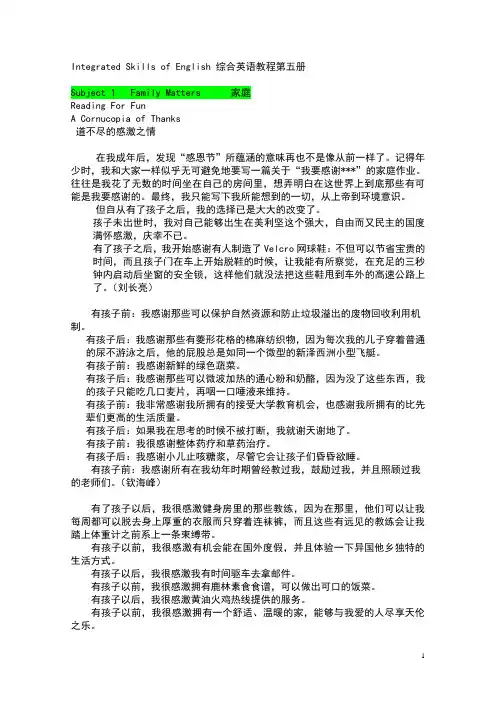
Integrated Skills of English 综合英语教程第五册Subject 1 Family Matters 家庭Reading For FunA Cornucopia of Thanks道不尽的感激之情在我成年后,发现“感恩节”所蕴涵的意味再也不是像从前一样了。
记得年少时,我和大家一样似乎无可避免地要写一篇关于“我要感谢***”的家庭作业。
往往是我花了无数的时间坐在自己的房间里,想弄明白在这世界上到底那些有可能是我要感谢的。
最终,我只能写下我所能想到的一切,从上帝到环境意识。
但自从有了孩子之后,我的选择已是大大的改变了。
孩子未出世时,我对自己能够出生在美利坚这个强大,自由而又民主的国度满怀感激,庆幸不已。
有了孩子之后,我开始感谢有人制造了Velcro网球鞋:不但可以节省宝贵的时间,而且孩子门在车上开始脱鞋的时候,让我能有所察觉,在充足的三秒钟内启动后坐窗的安全锁,这样他们就没法把这些鞋甩到车外的高速公路上了。
(刘长亮)有孩子前:我感谢那些可以保护自然资源和防止垃圾溢出的废物回收利用机制。
有孩子后:我感谢那些有菱形花格的棉麻纺织物,因为每次我的儿子穿着普通的尿不游泳之后,他的屁股总是如同一个微型的新泽西洲小型飞艇。
有孩子前:我感谢新鲜的绿色蔬菜。
有孩子后:我感谢那些可以微波加热的通心粉和奶酪,因为没了这些东西,我的孩子只能吃几口麦片,再咽一口唾液来维持。
有孩子前:我非常感谢我所拥有的接受大学教育机会,也感谢我所拥有的比先辈们更高的生活质量。
有孩子后:如果我在思考的时候不被打断,我就谢天谢地了。
有孩子前:我很感谢整体药疗和草药治疗。
有孩子后:我感谢小儿止咳糖浆,尽管它会让孩子们昏昏欲睡。
有孩子前:我感谢所有在我幼年时期曾经教过我,鼓励过我,并且照顾过我的老师们。
(钦海峰)有了孩子以后,我很感激健身房里的那些教练,因为在那里,他们可以让我每周都可以脱去身上厚重的衣服而只穿着连袜裤,而且这些有远见的教练会让我踏上体重计之前系上一条束缚带。
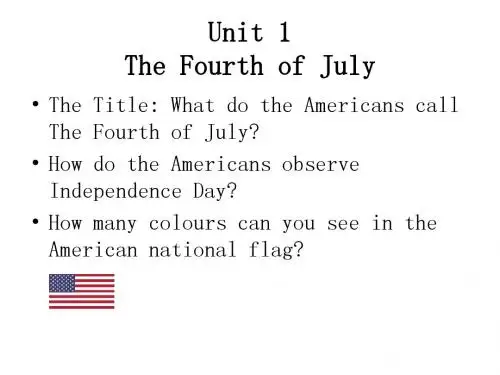
Lesson 1 Where Do We Go from Here1. 一个无关紧要的谎言总比一个善意的谎言要好。
2. 为了挫败各种蓄意培植的低人一等的心态,黑人必须直起腰来宣布自己高贵的人格。
3. 黑人必须以一种竭尽全力自尊自重的精神,大胆抛弃自我克制的枷锁。
4. 必须懂得没有爱的权力是毫无节制、易被滥用的,而没有权力的爱则是多愁善感、脆弱无力的。
5. 正是这种邪恶的权力和没有权势的道义的冲突构成了我们时代的主要危机。
6. 在本世纪之初,这种建议会受到嘲笑和谴责,认为它对主动性和责任感起到负面作用。
7. 事实上,人们从事改善人类处境的工作,从事传播知识、增强实力、丰富文学财富以及升华思想的工作并不是为了谋生。
8. …….它能够花费几十亿美元帮助上帝的孩子自立于这个世界。
9. 除非主张暴力的少数人得到大多数人的同情和支持,不和他们对抗,否则,暴力革命很少或者说几乎没有成功的。
10. 我们要懂得道义的苍穹长又长,它终将落向正义。
Lesson 2 Two Kinds B. Sentences1. 我的头发没有做出我要的大卷花,而是给我弄成一头乱蓬蓬的黑色小卷毛。
2. 在她告诉我答案前,她对了对手中的杂志,看看赫尔辛基是否能这样发音。
3. 她似乎被这音乐吸引住了。
这钢琴曲不长,但有点狂乱,有着迷人的特点,乐曲一开始时快节奏的,接着是欢快跳动的节拍,然后又回到嬉戏的部分。
4. 如果她的才气和她的脾气一样大,她早就出名了。
5. 我最喜欢练习的部分是花哨的谢幕行礼的动作:先出右脚,脚尖点在地毯的玫瑰图案上,身子侧摆,左腿弯曲,抬头,微笑。
6. 一股凉气从头顶开始,然后一点点传到全身。
但我却不能停止演奏,双手好像着了魔似的。
我不停地想,我的手指会调整好,就像火车会被扳倒正确的轨道上。
7. 她的脸部失去了表情,嘴巴紧闭,双臂无力地垂下。
她退出了房间,神色惊异,好像一小片枯黄的树叶被风吹走了,那样的单薄、脆弱、毫无生气。
One Wr iter's Beg innin gs 1 Ilearn ed fr om th e age of t wo or thre e tha t any room in o ur ho use,at an y tim e ofday,was t hereto re ad in, orto be read to.My mo therreadto me. She'd re ad to me i n the bigbedro om in themorni ngs,whenwe we re in herrocke r tog ether, whi ch ti ckedin rh ythmas we rock ed, a s tho ugh w e had a cr icket acco mpany ing t he st ory.She'd read to m e inthe d ining room on w inter afte rnoon s infront of t he co al fi re, w ith o ur c uckoo cloc kend ing t he st ory w ith "Cucko o", a nd at nigh t whe n I'd gotin my ownbed.I mus t hav egiv en he r nopeace. Som etime s she read to m e inthe k itche n whi le sh e sat chur ning, andthe c hurni ng so bbedalong with anystory. Itwas m y amb ition to h ave h er re ad tome w hileI chu rned; once shegrant ed my wish, but shereadoff m y sto ry be foreI bro ughther b utter. She wasan ex press ive r eader. Whe n she wasreadi ng "P uss i n Boo ts,"for i nstan ce, i t was impo ssibl e not to k now t hat s he di strus ted a ll ca ts.作家起步时我从两三岁起就知道,家中随便在哪个房间里,白天无论在什么时间,都可以念书或听人念书。
Why Don't We Complain?It was the very last coach and the only empty seat on the entire train, so there was no turning back. The problem was to breathe. Outside the temperature was below freezing. Inside the railroad car the temperature must have been about 85 degrees. I took off my overcoat, and a few minutes later my jacket, and noticed that the car was flecked(饰以斑点)with the white shirts of the passengers. I soon found my hand moving to loosen my tie. From one end of the car to the other, as we rattled through Westchester Country, we sweated; but we did not moan.这是整列火车最后一节车厢中唯一的一个空位子,所以也不必再掉头去找了。
问题是这里让人透不过气。
外面的气温在冰点以下,而火车车厢里的温度一定有85度左右。
我脱掉了大衣,几分钟后又脱掉了外套,并且我注意到车厢里望去星星点点的都是乘客们的白衬衫。
不久我就发现我的手开始在松领带了。
在火车哐啷哐啷地行进在威彻斯特县的时候,从车厢的一头到另一头,我们全都汗水淋漓,但我们没有吭声。
I watched the train conductor appear at the head of the car. "Tickets, all tickets, please!" In a more virile(雄壮的)age, I thought, the passengers would seize the conductor and strap him down on a seat over the radiator(暖气片)to share the fate of his patrons. He shuffled down the aisle, picking up tickets, punching commutation cards. No one addressed a word to him. He approached my seat, and I drew a deep breath of resolution. "Conductor," I began with a considerable edge to my voice……Instantly the doleful(消沉的)eyes of my seatmate turned tiredly from his newspaper to fix me with a resentful stare:what question could be so important as to justify my sibilant intrusion into his stupor(麻木不仁)?I was shaken by those eyes.I am incapable of making a discreet fuss, so I mumbled a question about what time we were due in Stamford(I didn't even ask whether it would be before or after dehydration could be expected to set in), got my reply, and went back to my newspaper and to wiping my brow.我看到乘务员在车厢的头里出现了。
英语专业综合教程5课文翻译综合教程第五册课文翻译Unit1TheFourthofJuly我第一次到华盛顿的时候是初夏那时我想我不应该再当一个孩子。
至少这是他们在八年级的毕业典礼上对我们说的。
我的姐姐菲利斯在同一时间从高中毕业。
我不知道她应该不再当一个什么。
但当作是送给我们俩的毕业礼物,我们全家在国庆日前往华盛顿旅游,那是传奇而著名的我国首都。
这是我第一次真正意义上在白天时乘坐火车。
当我还小的时候我们总是在夜晚乘坐运奶火车去康涅狄格海岸,因为它更便宜。
学期还没结束前家里就开始忙着准备旅行的事。
我们准备了两个星期。
父亲拿了两个大箱子和一个装满食物的盒子。
事实上,我第一次到华盛顿的旅途可以说是一个移动盛宴一在位子上安顿下来我就开始吃东西直到我们到了费城往后的某个地方才停下来。
我记得那是费城,是因为我们没有经过自由之钟对此我很失望。
母亲烤了两只鸡,然后把它们切成恰好一口一片的大小。
她打包了黑面包和黄油切片,青椒和胡萝卜条。
有来自Cushman面包店的亮黄色的周围有一圈扇贝形状的小冰蛋糕叫做“金盏花“。
有来自牛顿面包店的香辛小面包和岩皮饼,还有包裹着蛋黄酱的冰茶那是一家雷诺克斯大街上圣马可学校对面的西印度面包店。
还有母亲为我们准备的蜜桃和给父亲准备的莳萝腌菜,桃子上还有绒毛,单独包装,以免它们碰伤。
为了干净,母亲还准备了成堆的餐巾纸和一个小锡盒子里面装有浸了玫瑰水和甘油的毛巾,可以用来擦拭发粘的嘴巴。
我想要在餐车吃饭,因为我已经从书上读到过关于它们的一切,但母亲提醒了我无数次,餐车食品太贵,而且,你根本没法辨别那些食物上有谁的手在上面动过,也不知道,之前他们的手碰过什么地方。
我的母亲从未提及过直到1947年黑人还是不被允许进入前往南部的火车餐车。
通常,无论母亲是不喜欢的或无法改变的事她都会忽视。
可能她觉得如果把注意力转开事情就会过去。
后来我知道菲利斯的高中班级旅行去的就是华盛顿,但老师们私底下又把费用还回给了她,跟她解释说,班上的孩子除了菲利斯都是白人他们将住的那家旅馆会让菲利斯不高兴。
全新版大学英语综合教程5课文翻译1Unit1 One Writer's Beginnings作家起步时1.我从两三岁起就知道,家中随便在哪个房间里,白天无论在什么时间,都可以念书或听人念书。
母亲念书给我听。
上午她都在那间大卧室里给我念,两人一起坐在她那把摇椅里,我们摇晃时,椅子发出有节奏的滴答声,好像有只唧唧鸣叫的蟋蟀在伴着读故事。
冬日午后,她常在餐厅里烧着煤炭的炉火前给我念,布谷鸟自鸣钟发出“咕咕”声时,故事便结束了;晚上我在自己床上睡下后她也给我念。
想必我是不让她有一刻清静。
有时她在厨房里一边坐着搅制黄油一边给我念,故事情节就随着搅制黄油发出的抽抽搭搭的声响不断展开。
我的奢望是她念我来搅拌;有一次她满足了我的愿望,可是我要听的故事她念完了,她要的黄油我却还没弄好。
她念起故事来富有表情。
比如,她念《穿靴子的猫》时,你就没法不相信她对猫一概怀疑。
2 当我得知故事书原来是人写出来的,书本原来不是什么大自然的奇迹,不像草那样自生自长时,真是又震惊又失望。
不过,姑且不论书本从何而来,我不记得自己有什么时候不爱书——书本本身、封面、装订、印着文字的书页,还有油墨味、那种沉甸甸的感觉,以及把书抱在怀里时那种将我征服、令我陶醉的感觉。
还没识字,我就想读书了,一心想读所有的书。
3 我的父母都不是来自那种买得起许多书的家庭。
然而,虽然买书准得花去他不少薪金,作为一家成立不久的保险公司最年轻的职员,父亲一直在精心挑选、不断订购他和母亲认为儿童成长应读的书。
他们购书首先是为了我们的前程。
4 除了客厅里有一向被称作“图书室”的书橱,餐厅的窗子下还有几张摆放百科全书的桌子和一个字典架。
这里有伴随我们在餐桌旁争论着长大的《韦氏大词典》、《哥伦比亚百科全书》、《康普顿插图百科全书》、《林肯资料文库》,以及后来的《知识库》。
“图书馆”书橱里的书没过多久我就能读了——我的确读了,全都读了,按着顺序,一排接着一排读,从最上面的书架一直读到最下面的书架。
Unit 1 The Fourth of July1)我第一次去华盛顿是在那年刚入夏,这个夏天也是我从此告别孩提时代的开始。
至少,这是他们在我们八年级毕业时对大家这么说的。
我的姐姐菲利丝同时从高中毕业。
我不清楚她应该告别什么阶段。
不过,作为给我们俩毕业的礼物,全家人于七月四日赴华盛顿旅游,2)那是我第一次大白天乘火车。
小时候,我们常去康涅狄格海边,我们总是晚上搭乘运送牛奶的火车,因为车票更便宜。
3)早在放假前,家里就洋溢着准备出发的气氛。
我们打包就花了一个星期。
有两个很大的箱子,是爸爸拿的,还有一个装满食品的盒子。
事实上,我的那第一次前往华盛顿的旅途是个流动的宴席;舒舒服服地在座位上刚坐下来,我就开吃了,一直吃到火车抵达费城附近的地方。
我记得那是费城4)我妈妈烤了两只鸡,还将它们很漂亮地切成一口一块那么大小。
她带了黑面包片、黄油、青椒和胡萝卜条;还有那边上点缀着叫做“万寿菊”的有点儿黄黄的冰镇蛋糕,是从库什曼面包,每一只都分开来包,以免碰伤。
此外,为了整洁,还有一沓沓的餐巾,一块放在小铁盒子里浸泡着玫瑰水和甘油的小毛巾,擦黏糊糊的嘴巴用的。
5)我想要到餐车去吃饭,因为我阅读过这方面的内容。
但是,妈妈已经无数次地提醒过我,在餐车里吃饭要花很多钱,而且还不知道那些吃的东西出自于什么人的手,也不知道那双手刚碰过,但是那几个嬷嬷悄悄地把她交的预付款退还给她,对她解释说,除了她,我们自己去,”爸爸信誓旦旦,“而且远不止住在便宜肮脏的旅馆里待一个晚上。
”6)在华盛顿,我们有一间大房间,两张双人床,外加一张给我的儿童床。
那是一家位于后街的旅馆,店主是爸爸的朋友,此人从事房地产业。
第二天做完弥撒之后,我便一整天眯起眼睛抬头仰望林肯纪念堂。
在这里玛丽安·安德森放声高歌,之前美国革命女儿会因为她是黑人拒绝她在他们的礼堂歌唱。
或许就因为她是“有色的”,就像爸爸给我们讲这个故事的时候那么说的。
要么他很可能说的是“黑人(Negro)”,因为在当时我父亲是相当进步的。
7)我眯起双眼,因为我默默承受着自己童年时代每年夏天都要承受的痛苦,从六月底学校放假开始到七月底。
这个痛苦是因为在夏日的强光下张大眼睛受到伤害而造成的。
8)我是通过一层令人痛苦的圆环状的耀眼强光看见七月份的。
我一直痛恨七月四日,甚至在我意识到这种骗人的鬼话之前:这种庆祝是为这个国家的黑人的。
9)我的父母不认可太阳眼镜,也接受不了太阳镜的价格。
10)整个下午我眯起双眼抬头张望那些自由、逝去的总统以及民主的纪念碑,心想为什么华盛顿的光线和热量要比在纽约家乡强得多,甚至街上人行道的颜色也比家里的要白一些。
11)在华盛顿一天下午黄昏的时候,我和家人沿着宾夕法尼亚大道往回走。
我们俨然一个旅行团,妈妈白晳亮丽,爸爸棕色皮肤,我们三个女孩的肤色介于两者之间,由浅至深。
受到周围历史气氛和黄昏热浪的影响,爸爸决定再次请客。
他有很强的历史感,他天生有种并不张扬的戏剧性,而且对场景和旅行有种特殊的感触。
12)“我们停下来吃些东西凉快凉快好吗,琳?”13)离我们住的旅馆两个街区之遥,我们一家人停下脚步,在一家布雷耶冰淇淋和汽水店买了一盘冰淇淋。
室内,柜台光线昏暗,电扇下凉风习习,让我被强光照耀的双眼感到轻松多了。
我们的座位用绳子连在一起,个个神清气爽,围着餐巾,五个人并排在柜台前坐下。
我在爸爸和妈妈中间,两个姐姐在妈妈的另一边。
我们一字排开,靠着带有花纹的大理石柜台坐下。
女服务员张口说话,一开始谁也没听懂她在说什么,于是我们五个人就坐在那儿。
14)女服务员沿着我们向爸爸走去,再次说道,“我刚才说可以让你们外带,但是你们不能在这儿吃,对不起。
”然后,她垂下双眼,一副尴尬的样子。
我们突然听见她说的话了,同时听见的,响亮清晰。
15)挺起胸膛,义愤填膺,我和家人一个接一个地从柜台前的凳子上站起身来,转身大步跨出店堂,一言不发,但怒火中烧,似乎我们以前从来就不是黑人。
我加重语气地说道,“我们什么也没有做呀!”就是不对,不公平呀!难道我没有写过所有人都该享有自由民主的诗歌吗?除了因愧疚而默默无声,谁也没有对我的问题做出应答。
16)我的爸爸妈妈对不公正缄默无语,不是因为他们对此有什么责任,而是因为他们觉得本应该早有预料,并应该加以避免的。
这让我更加愤怒。
我的怒火并没人认可,也没人像我一样愤怒。
连我那两个姐姐也随着爸爸妈妈,装作没有发生过什么非同寻常、反美国的事情。
那只好由我自己来给美国总统写封信,表达自己的愤怒。
不过,我给爸爸看了我写在练习簿的信之后,他保证我下周可以在他的办公室打字机上将信打出来。
17)那个女服务员是个白人,那张柜台是白色的,那份我从来没在华盛顿吃的冰淇淋,以及我告别了童年的夏天都是白色的。
还有那年夏天我第一次去华盛顿的白色的热浪、白色的人行道和白色的石柱纪念碑在接下来的旅程中让我恶心。
那可算不上一件毕业礼物啊。
Unit 4 Force of Nature1)十几岁的时候,我生活在纽约州新罗谢尔市。
我的记事牌上贴着一张玛丽·居里的照片,她坐在一棵榆树下面,怀里抱着女儿,两岁的爱娃和九岁的爱莲。
对居里夫人我所知甚少,除了一些基本的东西:她和丈夫发现了放射性。
她是荣获两项诺贝尔奖的第一人。
她聪慧、执着,简直是一个传奇。
我当时还是一个小姑娘,还几乎没有人生的方向,与其说对公式和实验室里的实验好奇,还不如说对文字和编造出来的故事更有兴趣。
2)回想起来,我认为自己十分欣赏那张照片,并非因为那是玛丽·居里以及她所象征的东西,而是因为她的那种异国情调,或者也许是因为她怀抱两个女儿的模样。
我自己的母亲因为车祸受到重伤,躺在医院里,正在康复。
我想要她抱抱我,但是她做不到。
因此,取而代之的是,我崇拜玛丽了,在我的心目中,她成了天底下最坚强、最有能力的女性。
3)像其他女孩的奇思异想一样,我的想法里至少还有几分真实。
玛丽·居里夫人的女儿们都自力更生,成长为颇有成就的妇女,尽管她们的母亲在她们出生之前完全沉浸在研究工作之中。
居里是个我们今天可以称之为超有能力的多面手:她的工作彻底改变了对原子能和放射性的研究,而且她是学生们学习的少得可怜的几个女科学家之一。
她还是一个充满激情的女人,一辈子有很多时间要与现在医生可能诊断为严重抑郁症的病魔抗争。
最终,她那杰出的发现却让她和丈夫为之丧命。
4)1878年,居里10岁,她母亲死于肺结核。
这个叫玛利亚·斯可罗多夫斯卡的波兰小姑娘继续求学,好像什么事情也没有发生过。
但是,连着好几个月她得找个地方躲起来,放声大哭。
5)18岁那年,她在华沙附近一家有钱人家里当上了一名家庭教师。
结果,她爱上了查斯米尔·佐瓦斯基,一个19岁的学有所成的学生。
他们俩都热爱自然和科学。
但是,当查斯米尔宣布他和玛利亚想要步入婚姻殿堂时,他的父亲威胁要剥夺他的继承权。
她与他门不当户不对,出身贫寒,不过是个保姆。
绝对不行!拖了四年之后,终于,玛利亚对查斯米尔说:“如果你下不了决心,我也无法为你下决心。
”然后凭着现在对我而言是了不起的勇气,玛利亚带着微薄的积蓄乘火车去了巴黎。
在巴黎她改了名字,上了索邦大学——于是走进了历史。
6)1893年,她成了在索邦大学第一个获得物理学学位的女性。
如果您看过1943年拍摄的影片《居里夫人》,就会明白她早期做实验的大手笔,发现一个神秘的、隐藏着的新元素。
有一幕,扮演玛丽的女演员格里尔·加森在一个烧锅里搅动,满脸汗水。
晚上很迟的时候,玛丽和丈夫皮尔走进实验室看见试盘上凝结着一小块发光的东西。
“哦,皮尔!是那个吗?”玛丽惊呼道,泪水顺着面颊流淌下来。
是的,就是它——镭!7)现实却要艰苦得多——也没有那么浪漫。
玛丽是在1895年嫁给皮尔的,他们确实并肩工作到深夜。
然而,她们的实验室是那么的简陋、潮湿,所以女儿爱莲把那儿叫做“那个糟糕的、糟糕透了的地方”。
曾经有位声名显赫的科学家说过,要不是见到那张工作台,他会以为自己身处马厩。
8)终于,居里夫妇名扬全球,尤其他们于1903年因发现放射性荣获诺贝尔物理学奖之后。
在欧洲科学界,他们成了人们祝贺的对象,到处受到盛情款待,在巴黎家中受到来自远至新西兰的崇拜者的访问,来向他们致意。
9)然而,对居里夫妇而言,他们的成功埋下了他们悲剧的种子。
记得吗,他们几乎天天都为着放射性工作。
甚至在获得诺贝尔奖之前,皮尔就因暴露在这种强大能量中而身患重病。
他的手上和手指上有开放性的溃疡,而且走路越来越困难。
1906年,他跌倒在两匹高大驮马拉着的马车的道上,一个车轮碾过他的头部,他当场身亡。
10)父亲死的时候,爱娃·居里还不到一岁。
若干年以后,爱娃写道,皮尔的死注定了母亲生命大限的时刻:“玛丽·居里没有从年轻幸福的妻子转变为一个极度沮丧的寡妇。
这种蜕变并非一蹴而就而是根深蒂固。
孤寂和沉默的斗篷永远披在她的双肩上。
”玛丽年仅38岁。
葬礼后的星期天,她没有与家人和朋友们待在一起,而是躲进了实验室。
在日记里,她是这么对皮尔写的:“在这鸦雀无声的实验室里,我想和你说话,实验室里没有了你,我无法应付呀。
”11)在皮尔去世后,他和玛丽开始的工作并未停止。
因为分离了镭元素和钋元素,第二个诺贝尔化学奖荣归玛丽一人。
12)随着1914年第一次世界大战爆发,玛丽意识到流动的X光机器可以拯救战地医院里面的生命。
于是,她建立了一个称为“小居里”的车队,她和爱莲亲自驾驶一辆车。
13)后来,她又回到自己建立的镭研究所,从事教学工作,也外出旅行、讲学,直至1934年7月4日谢世,终年66岁。
死因是恶性再生障碍性贫血,很可能是由于她长期暴露在致命的镭和其他放射性元素的辐射中。
14)我所发现的玛丽·居里并非是一个偶像,而是一个有血有肉的女人。
她征服了职业上巨大的障碍,但是付出了巨大的个人代价。
现在我明白,她的一生何其复杂——的确集荣光与悲壮于一身。
Unit 7 The Art of Smart Guessing1)几年前,我给应聘者面试,问他们“你有什么经验?”这个问题,后来逐渐问烦了。
于是,我决定做一项单个问题的测试,从而了解这位新人是不是个善于解决问题的思考者。
问题如下:2)您乘坐一艘游艇,横渡太平洋。
驾驶员告诉您,游艇到了马里亚纳海沟最深的位置。
此时,有个笨手笨脚的客人不小心把一个重达12磅的炮弹掉进海里。
炮弹沉到海底要多久?3)在您往下读之前,请先来回答这个问题——要特别注意解题方法。
4)您是不是因为“信息不够”就完全瞎猜呢?您是不是过于拘泥于细节,而没能得到“绝对正确”的答案?或者说,您是不是先全神贯注在两个最重要的问题上——马里亚纳海沟有多深?炮弹在水里下沉的速度有多快?——然后才敢做出估计?5)大多数的面试者就是胡乱瞎猜,心想反正不可能百分之百地准确。